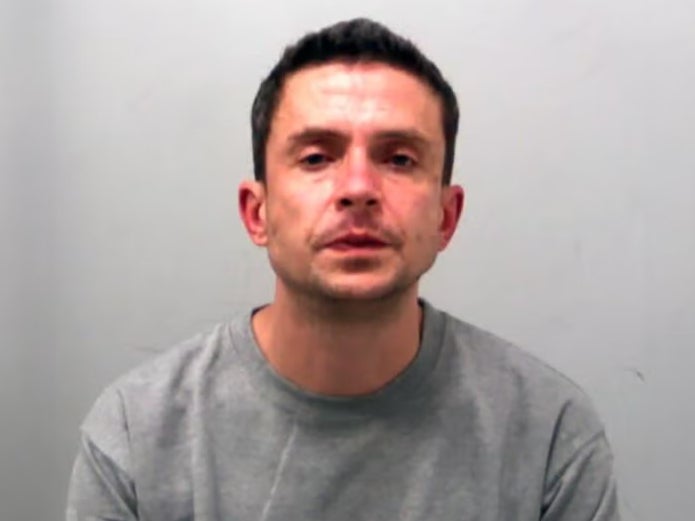Man who sent nude picture to teenage girl is jailed under new cyberflashing laws
Nicholas Hawkes sent images of his genitals to a teenage girl and a woman

A convicted sex offender has become the first to be jailed for cyberflashing crimes under new laws, after he sent non-consensual images of his genitals to two victims.
Nicholas Hawkes, 39, was arrested after Essex Police received a report that a 15-year-old girl and a woman had been sent explicit images of his erect penis over imessage and WhatsApp.
Following an investigation, he was charged and later pleaded guilty to two counts of sending a photograph of film of genitals to cause alarm or distress or humiliation. He has been jailed for 15 months.
Southend Crown Court heard that Hawkes had sent the images from his father’s phone after asking to use it for a call from probation while he was living at his address. After taking the phone to a private area, he sent an imessage picture to the teenager and a Whatsapp image to a woman, aged in her sixties.
The teenage girl was said to be left “overwhelmed and crying” by the image, with Hawkes making full admission to police officers upon his arrest.
Have you been affected by cyberflashing? Email holly.evans@independent.co.uk
These offences formed “part of an established pattern of behaviour” given that he was already a registered sex offender after he was convicted and given a community order for sexual activity with a child and exposure last year.
Speaking in his defence, Barry Gilbert insisted Hawkes was “not a pervert” and had been a man of good character until 2020, when his first offending begun. This came as a result of his ongoing PTSD and heavy cocaine use, which began after he was kidnapped and tortured in 2016.
In a botched robbery, he was taken hostage by two men for 18 hours, and was stabbed and held for ransom. His attackers were jailed for 10 and eight years respectively.
“PTSD is a syndrome much bandied about these days, but this man really does have PTSD of the worst type,” Mr Gilbert said. “It has ground away at him until [in] 2020 he began committing offences. He hasn’t started doing armed robberies or anything like that; the offences are all alike.
“To just dismiss Mr Hawkes as a pervert of some description, is completely unfair. He was never like this, this was enforced upon him.”

Sentencing him to 66 weeks for both his offending and the breach of his suspended and community sentences, Judge Samantha Leigh said: “You clearly are deeply disturbed and have a warped view of yourself and your sexual desires.”
She continued: “There is a duty I have and it is the duty to protect the public. There is only one sentence for this set of offending; it clearly crosses the custody threshold.”
As well as serving time behind bars, Hawkes was made the subject of a 10-year restraining order against his victims and a 15-year sexual harm prevention order, which forbids him from approaching or following women in public places and parks.
Cyberflashing became an offence in England and Wales on 31 January as part of the Online Safety Act, with perpetrators facing a maximum sentence of two years in prison.
The crime often includes offenders sending an unsolicited sexual image to people via dating apps, social media, Bluetooth or Airdrop. Often victims are shown a preview on their device, meaning that even if the transfer is rejected, they are still subjected to seeing the image.
Guidance has now been issued for the criminal offence, which follows similar recent action to criminalise upskirting and breastfeeding voyeurism.
Hannah von Dadelszen, the deputy chief crown prosecutor for CPS East of England, said: “Cyberflashing is a serious crime which leaves a lasting impact on victims, but all too often it can be dismissed as thoughtless ‘banter’ or a harmless joke.
“Just as those who commit indecent exposure in the physical world can expect to face the consequences, so too should offenders who commit their crimes online; hiding behind a screen does not hide you from the law.
“Using the new legislation, our prosecutors worked to deliver swift justice – securing a guilty plea just four days after Nicholas Hawkes sent disgusting photos to his victims.
“The Crown Prosecution Service has delivered the first conviction for cyberflashing, but it will not be the last and I urge anyone who has been a victim of this shocking crime – whether via instant messages, dating apps, or by any other means – to come forward, knowing you have the right to lifelong anonymity.”
Lord Chancellor and secretary of state for Justice, Alex Chalk, said: “Cyberflashing is a degrading and distressing crime which cannot be tolerated or normalised. We’ve changed the law so those who perpetrate these vile acts face time behind bars, and today’s sentence sends an unequivocal message that such behaviour will have severe consequences.”
Bookmark popover
Removed from bookmarks